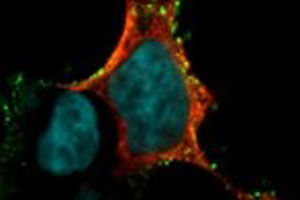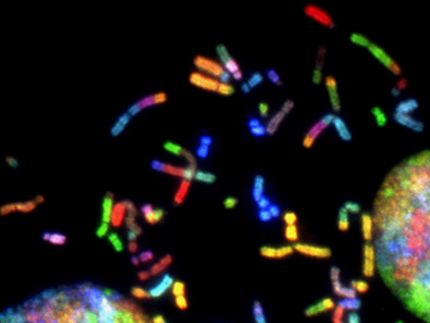Control of cellular recycling pathways
Researchers shed light on the highly organized and complicated regulation of cellular turnover
Together with researchers from the University of Rome/Italy and the Italian National Institute for Infectious Diseases scientists from the Freiburg Institute for Advanced Studies (FRIAS) and the Center for Biological Systems Analysis (ZBSA) shed light onto the highly organized and complicated regulation of cellular turnover.

© Dr. Jörn Dengjel
Bio-molecules within human cells are constantly being synthesized and degraded. This turnover is important for basic cellular processes, but it also plays a role in stress responses. Its deregulation has been linked to several diseases, amongst others cancer and neurodegenerative disorders like Parkinson’s. By combining analytical and cell biological approaches, the international research team between Freiburg and Rome identified a new pathway regulating protein interactions and their influence on cellular recycling.
One of the recycling pathways, autophagy or cellular “self digestion”, has been a focus of Jörn Dengjel’s research for many years. In times of poor energy supply, this self digestion helps to secure the cells’ survival. A protein that plays an important role in autophagy regulation is AMBRA1. In their paper, the Freiburg-based research group identified a dynamic phosphorylation site on the protein AMBRA1. Dengjel’s Italian colleagues could further show that during growth factor shortage phosphorylation on this specific site is removed, activating AMBRA1, which in turn leads to increased cellular turnover and survival of the cells.
Original publication
Most read news
Original publication
Francesca Nazio, Flavie Strappazzon, Manuela Antonioli, et al., “mTOR inhibits autophagy by controlling ULK1 ubiquitylation, self-association and function through AMBRA1 and TRAF6”, Nature Cell Biology 2013
Topics
Organizations
Other news from the department science

Get the life science industry in your inbox
By submitting this form you agree that LUMITOS AG will send you the newsletter(s) selected above by email. Your data will not be passed on to third parties. Your data will be stored and processed in accordance with our data protection regulations. LUMITOS may contact you by email for the purpose of advertising or market and opinion surveys. You can revoke your consent at any time without giving reasons to LUMITOS AG, Ernst-Augustin-Str. 2, 12489 Berlin, Germany or by e-mail at revoke@lumitos.com with effect for the future. In addition, each email contains a link to unsubscribe from the corresponding newsletter.





















































